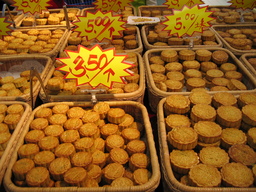
Mooncakes at Carrefour
 Mooncakes at Carrefour |
"I wonder when the Moon Festival is this year?" I pondered aloud yesterday morning. Meenday was the only other person present, though the question was more rhetorical than a date I actually needed to place on my calendar.
"Let me check my scheduler," she offered. I raced over to my laptop to see if the built-in holiday feature of Emacs could find the date more quickly.
We both came up with October 6.
"Hmm. That's another month yet. I can't wait until mooncakes start going on sale. I like the Hong Kong style I grew up with best, though the Urumqi branch of Carrefour actually makes some pretty nice ones. They make a mean Oolong-tea-flavored mooncake."
"Oh, so you want to eat my flesh and blood, then?"
I wasn't quite sure I followed. Meenday and I speak with each other in Chinese. There's still a lot of basic conversation I have difficulty comprehending with any Chinese speaker. Additionally, as one of Xinjiang's minorities, educated outside of the Chinese system, I know that Meenday makes errors in grammar and pronunciation herself when speaking Chinese. Still, it seemed unlikely that she could be articulating anything close to what I understood.
"You know the real reason why the Chinese celebrate the Moon Festival, right?" Meenday continued on.
I thought back to the stories my mother read me about the Moon Festival in my childhood. I recalled a tale relating how one year in ancient China, rather than one sun rising, nine suns rose. This immediately led to drought and crops failing. The emperor consulted all of his ministers, nobody knew what to do.
Eventually an archer came forth and shot eight of the suns out of the sky. As his reward he was granted a pill of immortality. Rather than swallowing it immediately, he took it home and hid it underneath his pillow.
The archer's wife found the pill and swallowed it. This was the point in the story where my recollection became hazy. Somehow--perhaps as a punishment for taking the pill which was not meant for her, or perhaps it was a side-effect of the pill of immortality--she was transformed into a white rabbit and exiled to the moon. Where western cultures see the smiling face of the man-in-the-moon, Chinese see a white rabbit--the wife of the archer. In honor of this event, the Chinese began to bake mooncakes, celebrating on the night of the fullest moon of the year.
I thought about the story and the yummy mooncakes I ate every year. Red bean paste filling wasn't bad, black bean paste even better. Lotus-seed paste mooncakes were the best. Aside from which filling, an additional choice when selecting mooncakes was yolk-count: zero, one, or two. (Whole yolks baked into a mooncake are, naturally, a representation of the moon.) What could eating a heavy, sweet, mooncake have to do with insulting Meenday?
Then it hit me... I recalled once hearing that the Moon Festival wasn't really an ancient tradition based on some legend. All that "holiday story" business was just a cover. Over certain dynasties the Chinese were ruled by foreign masters, the last being the Manchus, whose Qing dynasty ended not even one-hundred years ago. The Moon Festival was really created as a means to pass messages of resistance under one such period of foreign subjugation. To fight the foreign occupiers, mooncakes were baked with messages inside: communicating, organizing, resisting. This tradition began during the Yuan Dynasty.
Meenday is Mongol: her ancestors ruled over not just China, but the greater part of the Middle East, Europe, Tibet and Southeast Asia for generations. China's Yuan Dynasty (1271-1368) answered to the Mongolian Khans.
She conveyed her opinion of the Moon Festival without the least trace of seriousness, laughing and smiling. Lighthearted as it was, the conversation did remind me how relative the perspective of history can be. Meenday said that the Moon Festival (referred to in Chinese as Mid-Autumn Festival) is really the, We-Hate-the-Mongols-Festival.
I still maintained that there was nothing better than a solid, lotus-seed paste mooncake, with one or no yolk.